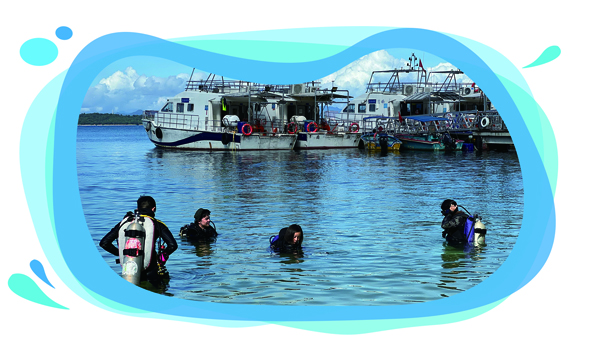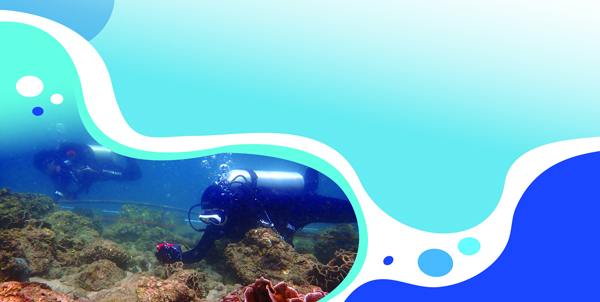Young guardians of oceans
From data modeling to coral restoration, a new generation of young ocean stewards is weaving intelligence and action into China's blue future.


Each November, Fujian province becomes a hub for marine experts from around the world, united by a shared mission: protecting the ocean.
This year, on Nov 6, Xiamen hosted the opening ceremony of the 2025 World Ocean Week under the theme "New Engine of Blue Development for the Marine Community with a Shared Future".
At the ceremony, the National Satellite Ocean Application Service (NSOAS) officially unveiled SkyOcean, the world's first artificial intelligence-based marine large model. The system can accurately forecast ocean conditions up to 10 days in advance.
This achievement owes much to 10 students from Sun Yat-sen University, including Yu Yuncong, a 24-year-old master's student from Guangzhou, Guangdong province, who played a key role in developing and deploying the core model.
"It's exciting to see cutting-edge AI technology put into real-world projects — even integrated into national operational systems — rather than remaining just a concept in academic papers," Yu said.
He explained that traditional ocean forecasting relies on physical models, which require solving intricate equations and often struggle to capture rapidly changing ocean dynamics. By contrast, AI can learn evolving patterns directly from observational data. When satellites pass over target areas, SkyOcean can generate forecasts within hours.
Since the project began in 2022, Yu and his teammates have spent countless hours testing multiple models and training approaches to identify the most effective solutions across diverse ocean scenarios.
Their efforts have paid off: at an earlier evaluation meeting hosted by NSOAS, experts concluded that SkyOcean's prediction accuracy has reached internationally advanced levels.
Yet the team is aiming even higher — using AI to assist not only experts but also the wider public.
"We're exploring a multi-agent model that can directly inform decision-making, similar to how ChatGPT operates," Yu said.

Grassroots guardians
As national institutions advance marine technology from above, community groups are working just as hard beneath the waves. At the 2025 Ocean NGO Forum in Shenzhen, Guangdong province, Xiao Wei took the stage to highlight the coral conservation achievements in the city's Dapeng New District. Dive for Love, the organization he works for, has helped restore a splash of color to the reefs.
Held from Oct 28 to 29 as a parallel event to the 2025 China Marine Economy Expo (CMEE), the forum brought together experts from government agencies, research institutions, and social organizations.
Xiao explained that Dive for Love requires every full-time employee to be a certified diver. "Only by seeing it with your own eyes can you truly understand what we're protecting," he said.
When Xiao first joined Dive for Love seven years ago, he couldn't dive at all. But within just three months, he earned an instructor-level certification and now oversees the organization's diving programs.
According to him, restoring coral is a long and delicate process — a fist-sized piece of coral can take years to grow. To help speed recovery, Dive for Love has trained a large group of volunteer divers skilled in coral cultivation. They collect coral branches broken by waves, place them in tank-based nurseries, and later transplant them back onto the reefs.
The volunteers have also carried out more than 20 dawn dive marathons — extended underwater cleanup sessions that begin at daybreak. Many travel from downtown to join the dives, collectively recovering over 1,000 kilograms of marine debris.
"In marine conservation, NGOs' greatest strength lies in mobilizing volunteers," Xiao said.
Dive for Love has also partnered with local authorities to establish two pilot coral protection zones, rescuing over 300 coral fragments so far, he added.
The organization is now working to turn coral protection from a specialized task into a public movement. For example, it has launched a VR exhibition that allows people to "dive" from land and is exploring more cross-sector partnerships to weave ocean conservation into everyday urban life.
"With our expertise and data, we aim to turn knowledge into action — empowering the public to take part in ocean-friendly activities and make meaningful contributions to ocean protection," Xiao said.
At another CMEE venue, 27-year-old An Yutong, an intern with Dive for Love, introduced coral-themed cultural products to visitors while raising funds for conservation projects.
A graduate of the University of Florida with a degree in wildlife ecology and conservation, An joined the organization out of her love of diving. Every time she descends underwater, she feels as if she is in a quiet dialogue with the ocean — each dive offering a fresh glimpse into how the reef lives, breathes, and changes.
She has seen more young people with similar passions gather at Dive for Love. Volunteers come from diverse backgrounds — marketing, law, design — not just biology.
"Working with Dive for Love gives young people the chance to learn and grow in real ecological settings, gradually bridging the gap between humans and the ocean," she said.
Still an intern for now, An is set to become a full-time staff member. She hopes the new role will allow her to plan and lead more projects, and to welcome talent from all fields to join in protecting coral reefs and embracing the ocean.



































